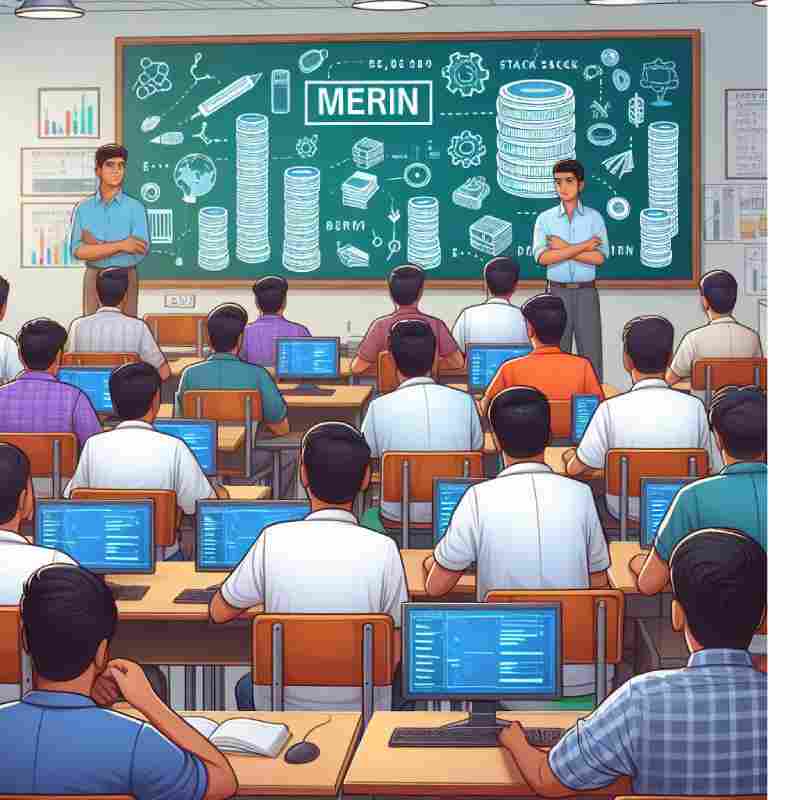The MERN stack stands out as a leading choice for web development, unifying the entire development process under a single language—JavaScript. This comprehensive stack incorporates MongoDB, a document-oriented database; Express.js, a web application framework; React.js, a JavaScript library for crafting user interfaces; and Node.js, a JavaScript runtime environment. The MERN nomenclature is derived from the initials of its core components.
Renowned for powering web applications of major platforms like Airbnb, Uber, and Netflix, the MERN stack offers lucrative salary prospects due to high demand. Embarking on a career in MERN development is a rewarding pursuit, and this article serves as a guide for aspiring professionals.
In this post, we will explore the advantages of MERN programming, showcase how developers can leverage it to build impressive web applications, and shed light on the career opportunities available in the field. Additionally, we will outline the path to becoming a proficient MERN developer through a Full Stack Development course, detailing the essential skills for success in this dynamic field.
What is the MERN Stack?
The MERN stack, comprising MongoDB, Express.js, React.js, and Node.js, is a widely adopted technology stack for web development. It provides a comprehensive solution for building scalable and efficient web applications, with MongoDB handling data storage, Express.js simplifying server-side development, React.js creating dynamic user interfaces, and Node.js serving as the runtime environment.
The MERN stack’s cohesive integration enables the efficient creation of modern, single-page applications, making it an excellent choice for diverse web development projects. Its popularity stems from streamlining the development process, fostering code reusability, and supporting the creation of high-performance applications.
How Does the MERN Stack Work?
The MERN stack’s four key technologies—MongoDB, Express.js, React, and Node.js—play specific roles in building modern, full-stack web applications. MongoDB stores and manages data in a flexible, JSON-like format, while Express.js streamlines server-side development. React.js handles the client-side user interface, and Node.js facilitates server-side execution, fostering seamless communication between the client and server.
The MERN stack’s JavaScript-based nature promotes code reuse and allows developers to work seamlessly across front-end and back-end components, making it an ideal choice for creating dynamic and responsive web applications.
MERN Stack is Easy to Learn
The MERN stack is considered relatively easy to learn, especially for developers familiar with JavaScript. Its strength lies in the consistent use of JavaScript across the entire stack, enabling smooth transitions between front-end and back-end development.
React’s component-based architecture simplifies the development of modular and reusable UI elements, while Node.js’s usage of JavaScript on the back end makes it convenient for developers already familiar with the language. MongoDB’s intuitive JSON-like format further contributes to the ease of learning, making the MERN stack an efficient choice for developers aiming to build scalable web applications.
Role of Node.js in MERN Stack
In the MERN stack, Node.js plays a crucial role as the back-end runtime environment. It enables server-side JavaScript execution, promoting code reuse and simplifying the development process. Integrated with Express.js, Node.js forms a powerful and efficient server environment, handling API development and ensuring asynchronous, non-blocking I/O for scalability. Its event-driven architecture makes Node.js suitable for real-time applications, enhancing overall performance and responsiveness.
Why Learn MERN Stack Web Development?
Learning the MERN stack provides a comprehensive toolkit for creating dynamic and efficient web applications. MongoDB ensures flexibility in data handling, Express.js streamlines server-side development, React simplifies UI creation, and Node.js enables a unified language throughout the stack. The MERN stack’s widespread adoption by tech giants underscores its relevance in the competitive job market.
The stack’s versatility aligns with industry trends, making it a valuable skill for aspiring developers. Mastering the MERN stack training in Kolkata empowers developers to build scalable, real-time applications with modern, user-friendly interfaces, opening doors to rewarding career opportunities.
World’s Popular Websites on MERN Stack
Major websites and applications leverage the MERN stack for robust and scalable solutions. Facebook, Airbnb, Walmart, LinkedIn, and Netflix are among the prominent users, showcasing the stack’s effectiveness across various industries. Its adoption by these entities highlights its applicability in building high-performance, feature-rich web applications.
Skills for MERN Stack Development
Proficiency in JavaScript, React, Node.js, Express.js, and MongoDB is fundamental for mastering the MERN stack. Frontend skills include React expertise, while backend development requires knowledge of server-side programming, RESTful API design, and MongoDB concepts. Skills in version control, debugging, testing, and deployment tools are also crucial for a MERN stack developer’s success.
Salary Package for MERN Stack Developers
Salaries for MERN Stack developers vary based on experience, location, company size, and industry demand. In India, entry-level developers may earn between ₹4 to ₹8 lakhs per annum, mid-level developers between ₹8 to ₹15 lakhs, and senior developers above ₹15 lakhs. In the USA, salaries tend to be higher, ranging from $60,000 to $100,000 for entry-level positions, $80,000 to $120,000 for mid-level, and well over $120,000 for senior developers.
Conclusion
Mastering the MERN stack emerges as a strategic imperative for aspiring developers. Its powerful combination of technologies offers a comprehensive toolkit for creating dynamic, scalable, and responsive web applications. Its widespread adoption by major players underscores its versatility and applicability across diverse industries.
Skills required for MERN stack development span both frontend and backend domains, ranging from JavaScript proficiency to knowledge of deployment tools. The promising career prospects, competitive salaries, and growing demand for MERN stack developers make it a valuable asset in the dynamic field of web development. As the digital landscape evolves, the MERN stack course in Kolkata remains a pathway to success in the expanding world of technology.
FAQs
- Why should I learn the MERN stack for web development?
- The MERN stack offers a comprehensive toolkit for building dynamic, efficient, and scalable web applications. Its versatility and adoption by major companies make it a valuable skill in the tech industry.
- What skills are essential for MERN stack development?
- Proficiency in JavaScript, React, Node.js, Express.js, and MongoDB is crucial. Additionally, knowledge of HTML, CSS, Git, Docker, and various development tools enhances a developer’s skill set.
- Which companies use the MERN stack for their web applications?
- Major companies such as Facebook, Airbnb, Walmart, LinkedIn, and Netflix utilize the MERN stack, highlighting its widespread adoption across various industries.
- What is the salary range for MERN stack developers in India?
- Salaries for MERN stack developers in India vary based on experience. Entry-level developers might earn between ₹4 to ₹8 lakhs per annum, mid-level developers between ₹8 to ₹15 lakhs, and senior developers above ₹15 lakhs.
- What is the salary range for MERN stack developers in the USA?
- In the USA, entry-level MERN stack developers can earn between $60,000 to $100,000, mid-level developers between $80,000 to $120,000, and senior developers well over $120,000.
- How does learning the MERN stack contribute to career opportunities?
- Mastering the MERN stack opens doors to diverse career opportunities, aligning with industry trends and meeting the demand for developers capable of creating modern, real-time web applications.
- What are the key components of the MERN stack that make it advantageous?
- The MERN stack’s key components include MongoDB for flexible data handling, Express.js for server-side development, React for interactive user interfaces, and Node.js for server-side execution of JavaScript.
- How does the MERN stack cater to the evolving expectations of web users?
- The MERN stack enables the creation of responsive, feature-rich web applications, aligning with evolving user expectations. Its adaptability and efficiency make it a valuable asset in the rapidly changing digital landscape.











